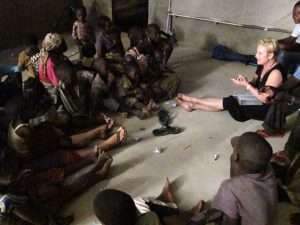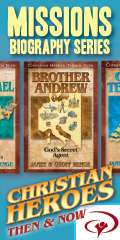
Dr. Dobson starts this book with a genealogy of his mother’s family. He traces his lineage starting with his great grandfather and goes all the way through his family, including his own children, particularly focusing on their spiritual lives. He specifically highlights his mother’s family because God promised her grandfather that every member of his family for four generations would be Christians. He received this promise after devoting lots of time in the last decades of his life to praying for the spiritual welfare of his children and for those yet to come. What dedication that took! And it has come to pass!
Personally, after reading this, I feel very convicted and challenged to pray not only for our daily needs but also for the spiritual lives of my children and the grandchildren that are yet to come.
Dr. Dobson has a rich spiritual heritage from both sides of his family. Many of them were preachers and wives of preachers. They prayed about their needs and attended church as a family. In general, they lived godly lives of integrity and maintained high moral standards. They did what they could to spread the Gospel. And they prayed for their children. A lot.
Dr. Dobson’s ideas were greatly shaped and influenced by his father during the cultural revolution of the 60’s and 70’s. Even though he attended graduate school at the University of Southern California in the late 60’s when attitudes were moving toward the legalization of abortion, his father strongly warned him against this type of thinking. He was very alarmed when he heard his son express the idea that “inner-city children are raised in such squalid conditions that it would have been better if they had never been born”. He responded so strongly, with tears in his eyes exclaiming, “Please don’t believe it for a moment, Jim. It is wrong, and it is evil.” He said he would never cast a single vote for any politician who would kill one innocent baby. Dr. Dobson always remembered that phrase and has repeated it many times since. His father was his moral compass during that tempestuous time of changing cultural values. He wonders how his value system might have evolved without his godly father who guided him into his adult years.
His father stepped in at pivotal times in his life to help his son stay on the right track and do what was best for his family and children. He admonished Dr. Dobson and Shirley, “devote yourselves wholeheartedly to a deep travail of prayer on behalf of the children God gives to you”. From that moment on, they prayed and fasted for their children. They prayed for the spiritual welfare of their children and that their children and children’s children would spend eternity in heaven with them.
And Dr. Dobson’s father warned him that he needed to be home and spend time with his family even though his career was extremely successful and time-consuming. So Dr. Dobson changed his lifestyle and worked closer to home (starting a radio program), and God used him mightily and blessed his ministry so that he reached more than he would have if he had continued speaking around the country.
In the next part of the book he speaks about how to lead children to the Lord and how parents should raise their children in the nurture and admonition of the Lord. He presents many scriptures about the responsibility of parents to pass on the teachings of scripture to their children.
One of the most clear scriptures on this subject is Malachi 2:15.
“Has not the Lord made (men and women) one? In flesh and spirit they are His. And why one? Because He was seeking godly offspring.”
God instituted marriage and gave men and women the ability to reproduce so that He could have godly offspring.
Dr. Dobson then addresses how to deal with prodigals and how to reach unsaved parents.
And in the next part of the book, he stresses the importance of parents having a strong emotional bond with their children and a close, loving relationship, since the culture no longer supports good moral values. It puts more responsibility on parents and the homes to teach and enforce good values and character since the support system of the greater society has vanished.
He tells us that if our children know we care about them, they will be more likely to listen to us when we tell them what we believe.
Dr. Dobson then relates the stories of two men who learned to put family values above their careers and how God blessed them.
Then there’s a chapter about the spiritual training of children, which he believes should start as soon as they are born.
In the last chapter, he discusses the value of leaving a monetary inheritance versus the eternal importance of leaving a spiritual inheritance for your children. He makes it clear that the spiritual inheritance is by far the most important legacy we can leave.
Then the book closes with appendices that contain ideas for building our legacy. There are activities and stories to help us teach our children spiritual truths that build a strong foundation for them.
I found this a very inspiring, enlightening book. It pulled together all of Dr. Dobson’s teachings and efforts on behalf of preserving and strengthening the family during the course of his ministry. He considers this book the capstone of the dozens of books he has written in the past.
Of this book he says, “this ‘passing on’ of the Christian faith to one’s children first, and then to preserving it for future generations” is what all his other books have pointed to.
Here is a trailer for the book featuring Dr. Dobson talking about “passing the baton” of the Gospel to the next generation:
Passing on our faith to our children is our most important task as parents. And it takes dedicated prayer and living a faithful life in front of them to do this.
I’m really glad that this book came into my life “for such a time as this”. I’m thankful that Family Talk gave me this opportunity to read and review this book because it has made a big impact on my thinking and has given me direction in praying for my children. They sent me a copy to review, and it came at the perfect time in my life and the life of my family.
~~~~~~~~~~~~~~~~~~~~~~~~~~~~~~~~~~~~~~~~~~~~~~~~~~~~~~~~~~~~~~~~~~~~~~~~~~~~~~~~~~~~~~~~~~~~~~~~~~~~~~~~~~~~~~~~~~~
This is the end of my review of the book, but I have a few more thoughts on the subject of legacy that I would like to share here.
Another scripture that I feel is important for us to take into account when thinking about this subject is one that tells us why God chose Abraham to be the father of His chosen people.
As Genesis 18:19 says in the Darby translation:
“For I know him that he will command his children and his household after him, and they shall keep the way of Jehovah, to do righteousness and justice, in order that Jehovah may bring upon Abraham what he hath spoken of him.”
He knew that Abraham would teach his children the ways of the Lord. He knew how strong his faith and dedication to the Lord were, and how faithful he would be to teach his children and make sure that they walked in the ways of the Lord, too.
And just look at the long-lasting legacy that Abraham has had!
There have been several songs that have spoken to me about this subject through the years. The first was one by Sara Groves called “Generations”. If you would like to listen to a song that illustrates the importance of living a godly life and affecting the generations after you, here is a great song:
I wrote a blog post about this some time ago. It includes two really good songs about legacy, too. Sometimes music can get a point across better than just reading about a subject.
You can find that post here:
https://www.penneydouglas.com/2011/05/16/i-want-to-leave-a-legacy/












 "Oh that God would give every mother a vision of the glory and splendor of the work that is given to her when a babe is placed in her bosom to be nursed and trained! Could she have but one glimpse in to the future of that life as it reaches on into eternity; could she look into its soul to see its possibilities; could she be made to understand her own personal responsibility for the training of this child, for the development of its life, and for its destiny,--she would see that in all God's world there is no other work so noble and so worthy of her best powers, and she would commit to no other's hands the sacred and holy trust given to her." -JR Miller
"Oh that God would give every mother a vision of the glory and splendor of the work that is given to her when a babe is placed in her bosom to be nursed and trained! Could she have but one glimpse in to the future of that life as it reaches on into eternity; could she look into its soul to see its possibilities; could she be made to understand her own personal responsibility for the training of this child, for the development of its life, and for its destiny,--she would see that in all God's world there is no other work so noble and so worthy of her best powers, and she would commit to no other's hands the sacred and holy trust given to her." -JR Miller






